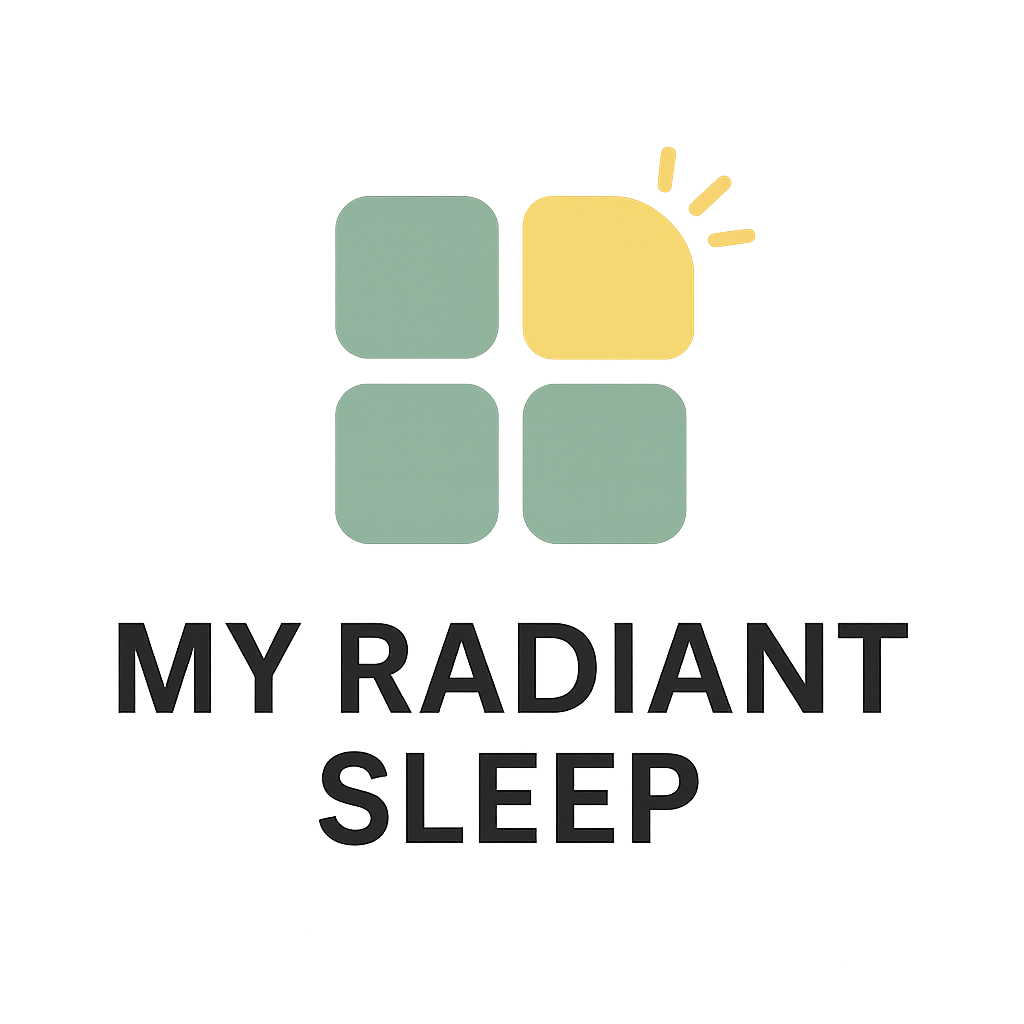(Last Update: 09/12/2025)
Poor sleep can impair memory, weaken the immune system, disrupt metabolism, and increase the risk of chronic diseases. Sleep is as important as food and water, but its biological complexity is only partially understood (Cleveland Clinic).
According to the National Heart, Lung, and Blood Institute, sleep affects nearly every part of the body, for individuals with sleep disorders such as sleep apnea, a Sleep Apnea Monitor can aid in achieving restful sleep.
This article will examine the purpose of sleep, its stages, and how rest supports brain function, metabolism, and immune function. Knowing how much sleep your body needs is key to lifelong health.
Why Sleep Is Good for Your Body and Brain
These biological functions are crucial for maintaining cellular health, enhancing cognitive performance, and promoting overall well-being. Consistently getting high-quality sleep is crucial for optimal daily function and the prevention of long-term diseases.
Sleep deprivation, on the other hand, can have serious consequences. It impairs cognitive function, increases the risk of chronic diseases, and weakens the immune system.
The sleep-wake cycle, also known as the circadian rhythm, is regulated by an internal clock that responds to light and darkness. This cycle makes us feel sleepy at night and alert during the day.
- Normal sleep restores both the brain and the body.
- During non-REM sleep, brain waves slow down and nerve cells recover and communicate.
- A regular sleep cycle supports the nervous system and maintains emotional balance and clear thinking.
Understanding sleep and its impact on the body is crucial to maintaining good health and preventing sleep disorders.
Recent advances in sleep research have shed light on the complex mechanisms that govern sleep and wakefulness. Clinical sleep medicine is a growing field that focuses on diagnosing and treating sleep disorders, including sleep apnea and insomnia.
Getting enough quality sleep is important for overall health and well-being. Most adults need 7 to 9 hours of sleep each night to support mental clarity, emotional stability, and physical recovery.
The Core Purpose of Sleep
Research suggests that sleep helps nerve cells communicate, improves memory, and allows the body cycles to function properly. Several studies show that without enough sleep, mental health and cardiovascular disease risks increase. Sleep is not a luxury but an essential function tied to energy conservation, disease control, and good health.
Common factors that affect sleep:
Lifestyle habits like screen time, caffeine intake, and inconsistent routines
- Sleep Environments like light exposure, noise levels, and room temperature
- Genetic factors that affect circadian rhythms and sleep architecture
To improve sleep quality and prevent sleep-related issues:
- Prioritize consistent sleep schedules
- Create an optimal sleep environment
- Follow sleep hygiene practices
Understanding how sleep affects the body is key to long-term health and preventing disease. Research shows that the brain regulates the sleep-wake cycle through biological mechanisms. Today, clinical sleep medicine offers treatments for conditions such as insomnia and sleep apnea.
Most adults require 7 to 9 hours of sleep each night to support physical recovery, cognitive function, and emotional well-being. However, lifestyle, environment, and genetics can often disrupt normal sleep patterns.
Having a regular sleep schedule, a controlled sleep environment, and practicing good sleep hygiene can improve sleep quality and reduce the risk of chronic sleep-related conditions. However, the amount of sleep you need varies based on age, health, and lifestyle.
Brain Basics
The brain regulates sleep and wakefulness through different brain wave patterns across different sleep stages.
The sleep-wake cycle is dependent on a complex system involving the hypothalamus, the suprachiasmatic nucleus, and related neural structures. This system maintains circadian balance and promotes sleep by responding to external cues, such as light exposure and physical movement.
Throughout the night, the brain cycles through various stages of sleep, including light sleep, deep sleep, and REM sleep, each with distinct brain activity and physiological functions.
Light sleep is the transition from wakefulness to a deeper level of sleep. Deep sleep, also known as slow-wave sleep, plays a crucial role in supporting physical repair and immune function.
REM sleep supports memory formation, emotional regulation, and enhances the brain’s cognitive and psychological resilience.
- Sleep architecture refers to the structure of nighttime sleep, including cycles of REM and non-REM stages.
- In sleep studies, researchers observe how brain waves slow down during deeper stages of sleep.
- These stages support learning, memory, and brain detoxification, showing how sleep supports the brain and body.
Sleep has a direct impact on brain development, cognitive performance, and emotional regulation. Research shows that quality sleep facilitates memory consolidation, synaptic plasticity, and learning.
If your sleep feels restless or inconsistent, upgrading your bedding can make a surprising difference. Discover the top modern bed sheets designed to improve your sleep by enhancing comfort, temperature regulation, and skin sensitivity.
Key chemical messengers—neurotransmitters and hormones—regulate the brain’s sleep-wake cycle. The hormone melatonin, released in response to darkness, tells the body it’s time to sleep, while cortisol promotes alertness during the day.
Sleep deprivation disrupts these regulatory systems and causes attention issues, mood instability, and neurodegenerative conditions. Understanding the brain’s role in sleep is crucial for treating sleep disorders and promoting brain health.
External factors, such as light exposure, physical activity, and sleep environment, also impact the circadian rhythm and its efficiency.
Johns Hopkins Medicine notes that a healthy amount of sleep is essential for brain plasticity—the brain’s ability to reorganize and retain information. Too little sleep reduces the brain’s capacity to learn and form long-term memories. Sleep also allows neurons to reset and clear out daily waste products.
Physical Restoration, Immune Strength, Metabolism, and Emotional Health
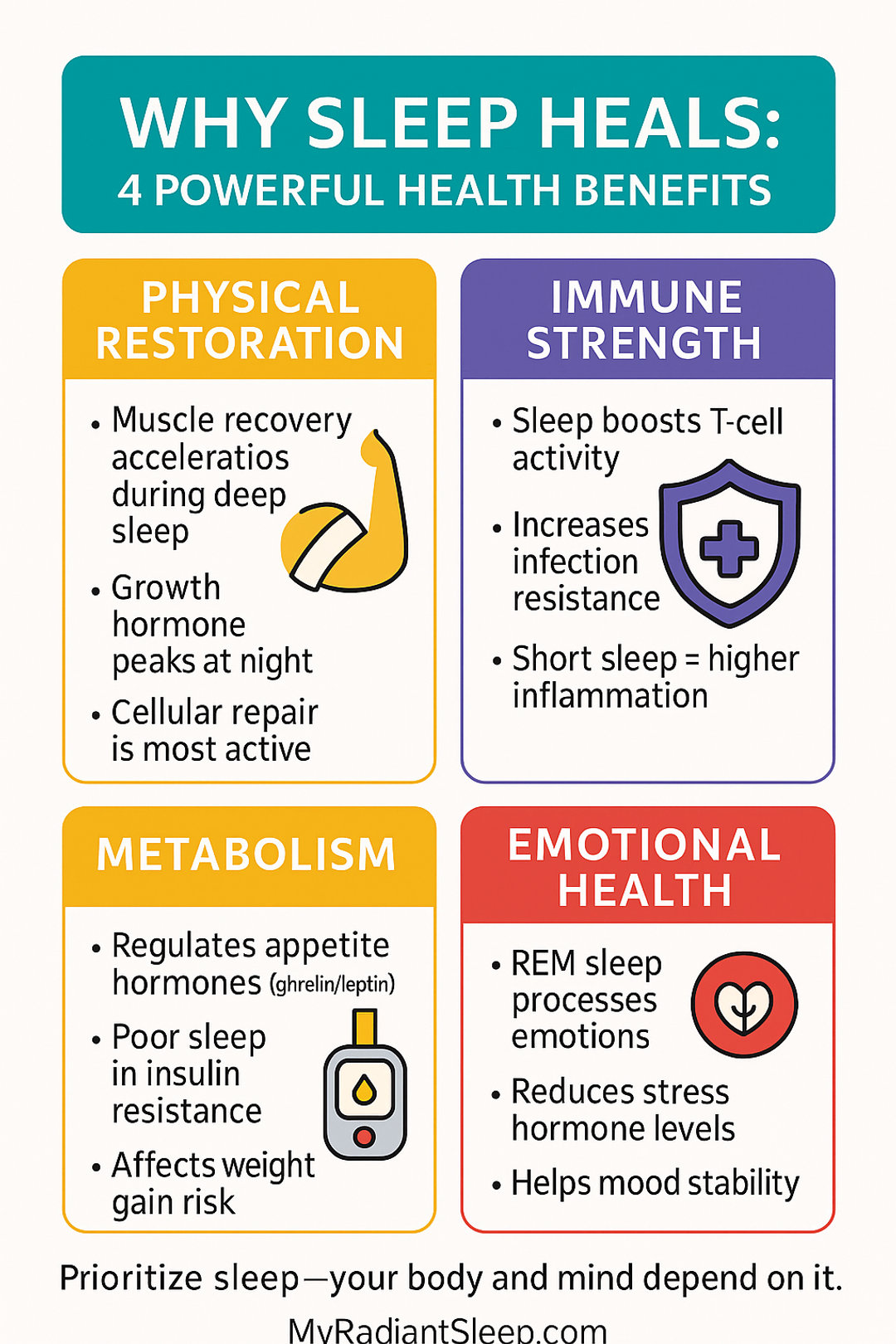
Prioritize your sleep—your body and mind depend on it.
Physical Restoration and Growth
One of sleep’s most basic functions is physical restoration. While you sleep—especially during deep, slow-wave sleep—your body goes into a recovery mode essential for healing and repair.
The body cycles through different stages of sleep each night, which are crucial for various restorative processes. Blood flow to muscles increases, allowing tissues and cells to regenerate after the wear and tear of daily activity.
This phase is particularly important for athletes and physically active individuals, but benefits everyone by maintaining strength, flexibility, and organ function.
- Sleep supports immune function by increasing infection-fighting proteins.
- Lack of sleep can cause health problems like weight gain and insulin resistance.
- People with trouble sleeping often report feeling irritable, anxious, and having less energy during the day.
Growth hormone, released primarily during deep sleep, plays a crucial role in muscle repair and tissue regeneration. It supports protein synthesis and replenishes energy reserves depleted through daily activity.
This process helps skin, bone, and nerve tissue recover after physical exertion, inflammation, or environmental stress. Sleep enables the body to address cellular damage efficiently, promoting resilience and structural repair.
Cleveland Clinic reports that chronic sleep deprivation disrupts these processes, slowing wound healing, weakening muscle recovery, and raising systemic inflammation markers.
For those interested in tracking their sleep cycles or improving rest through advanced features, investing in a smart mattress that supports sleep science can align with your body's natural rhythms and needs.
Immune System Support
The immune system relies heavily on restorative sleep to function properly. During deep sleep, the body increases production of cytokines—proteins that regulate immune responses—and boosts the activity of natural killer cells and T-cells, which help eliminate viruses, bacteria, and other pathogens. These immune components are key to defending the body against infection.
Inadequate sleep reduces the production of these immune factors and weakens the body’s natural defense mechanisms.
Healthline states that poor sleep contributes to mental health disorders such as anxiety and depression, while improved sleep quality can reduce emotional reactivity and enhance psychological resilience. Poor sleep quality can also impair vaccine efficacy by limiting the strength and duration of the immune response.
Metabolism and Weight Regulation
Sleep plays a crucial role in metabolic health. The hormones leptin and ghrelin, which regulate appetite signals, respond directly to changes in sleep duration. Leptin signals satiety to the brain, while ghrelin triggers hunger.
With inadequate sleep, ghrelin levels increase while leptin levels decrease, making you hungrier and more likely to eat late at night.
Insufficient sleep also disrupts glucose metabolism. A single night of poor sleep can reduce insulin sensitivity, a key factor in the development of prediabetes.
Over time, chronic sleep loss increases the risk of obesity and type 2 diabetes by promoting excess calorie intake, impairing blood sugar control, and elevates cortisol levels (National Heart, Lung, and Blood Institute).
These hormonal shifts increase the likelihood of weight gain and make weight loss more challenging, even with a proper diet and exercise regimen.
Emotional Well-Being
Sleep plays a critical role in supporting mental health and emotional stability. During REM sleep, the brain processes emotional experiences and modulates mood through the coordinated activity of the amygdala and prefrontal cortex.
Sufficient sleep promotes emotional resilience, improves cognitive control, and strengthens one's ability to respond to psychological stress. Sleep deprivation, on the other hand, disrupts the balance of these brain regions.
Healthline also explains that during sleep, the glymphatic system activates to flush out metabolic waste from brain tissue. This process helps eliminate harmful proteins like beta-amyloid, which are linked to Alzheimer’s disease and age-related cognitive decline.
Scientific Theories on Why We Sleep
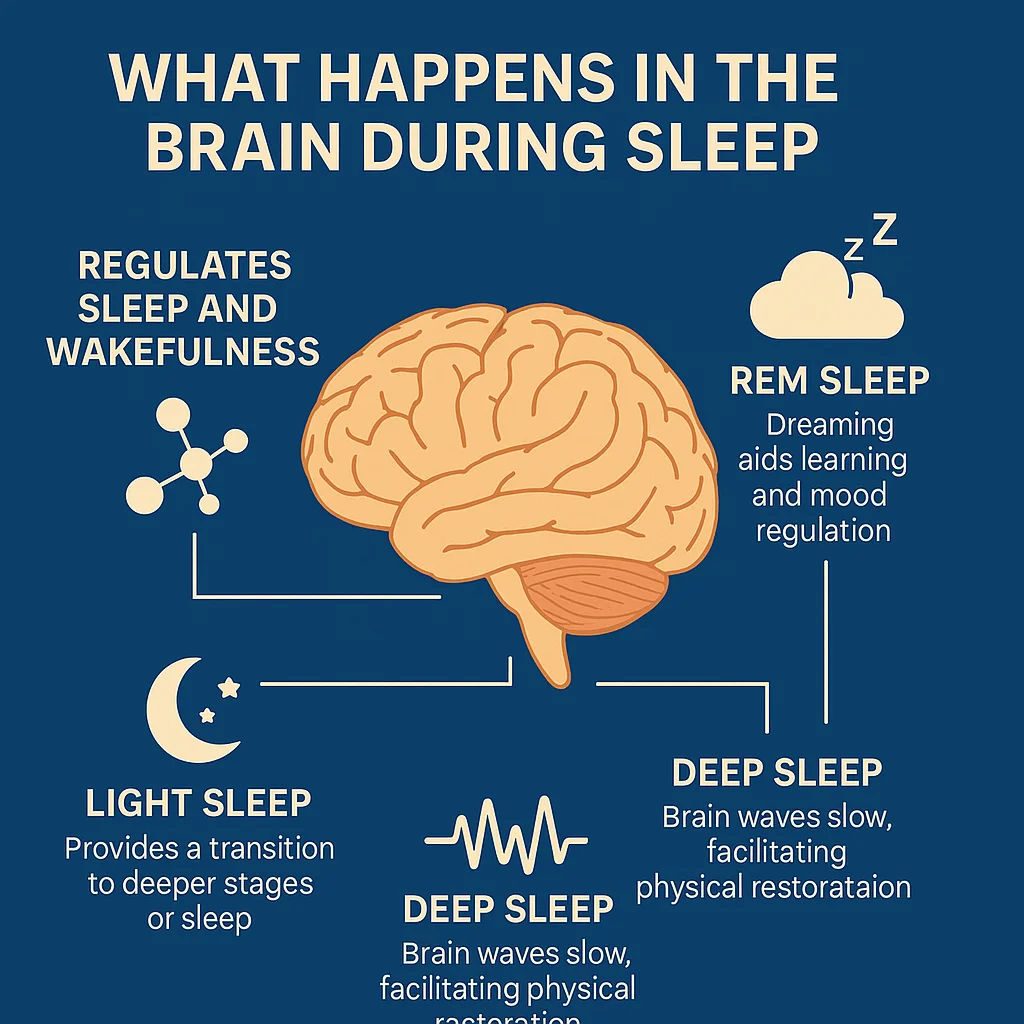
Energy Conservation Theory
The energy conservation theory is one of the oldest explanations for why we sleep. During sleep, the metabolic rate decreases by 10-15%, with deep sleep accounting for a reduction of up to 35% in energy expenditure.
This likely evolved to help humans conserve energy and calories during food scarcity (Healthline).
Modern lifestyles promote less sleep due to long work hours and digital distractions. Reduced sleep limits the body’s ability to conserve energy and increases the risk of metabolic disorders and cognitive fatigue.
Restorative Theory
The restorative theory suggests that we sleep to repair the body's physical and biochemical wear and tear. Everything from muscle fibers to brain cells undergoes restoration while we sleep.
Protein synthesis increases, muscle tissues repair themselves, and critical hormones, such as growth hormone and melatonin, are released to initiate healing (Healthline).
This theory explains why we feel refreshed and more physically capable after a good night’s sleep—and why injury or illness makes us feel more tired: the body is asking for time to heal.
Brain Plasticity Theory
The brain plasticity theory emphasizes the role of sleep in learning, memory, and cognitive function. During sleep, particularly REM and slow-wave sleep, our brains reinforce important neural connections and prune away those that are less frequently used.
The sleeping brain repairs and reorganizes neural connections, crucial for learning and memory. This helps us retain meaningful information while clearing “mental clutter.”
- The restorative theory says sleep repairs cells and tissues.
- The energy conservation theory says life sleeping reduces caloric needs.
- The brain plasticity theory says missed sleep weakens memory and learning. During sleep, the brain activates the glymphatic system to clear metabolic waste from neural tissues. This system removes toxic compounds, including beta-amyloid plaques linked to cognitive decline and Alzheimer’s disease (Healthline).
Sleep is a nightly reset that eliminates toxins, restores neural efficiency, and enhances brain network connectivity. These processes support emotional resilience, protect cognitive function, and improve intellectual performance, so the brain needs high-quality, uninterrupted sleep.
Sleep Stages, REM Sleep, and What Happens When We Sleep
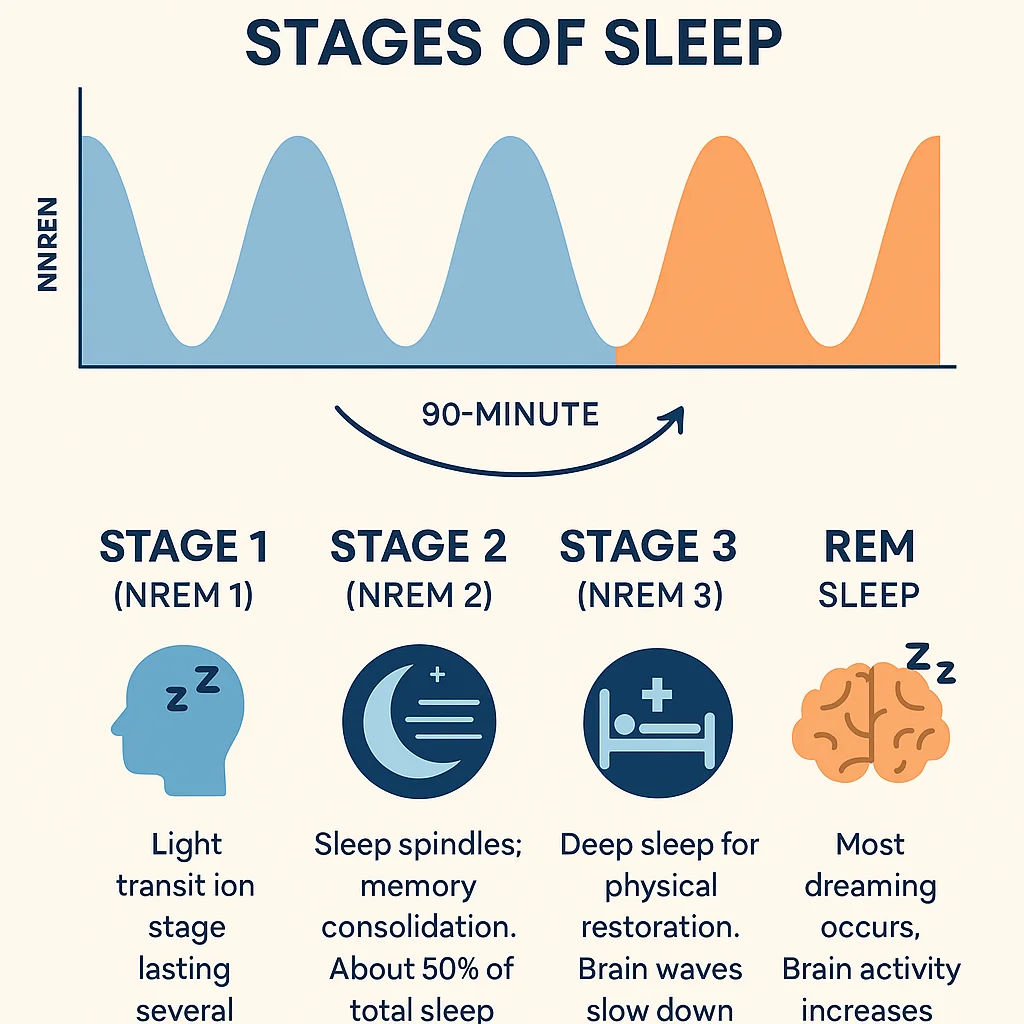
Sleep is not a single state but a series of dynamic stages that repeat throughout the night. A typical night involves cycling through different stages of sleep, with individuals alternating between non-REM and REM sleep stages, and the duration of REM periods increasing as the sleep session progresses.
A typical healthy adult cycles through four main sleep stages—Stage 1, Stage 2, Stage 3 (all non-Rapid Eye Movement or NREM sleep), and Rapid Eye Movement (REM) sleep—about four to six times per night. Each stage plays a crucial role in restoring the body and mind.
Stage 1 (NREM 1):
This initial sleep phase is a light transitional stage where your body starts to slow down. It lasts just a few minutes and accounts for about 5% of your sleep. During Stage 1, your heartbeat, breathing, and eye movements slow, and your muscles relax. You may experience sudden muscle twitches or the sensation of falling. According to the Cleveland Clinic, this stage is easy to awaken from, and many people don’t realize they’ve briefly fallen asleep.
Stage 2 (NREM 2):
This is the most common stage, accounting for approximately 45-55% of total sleep time. Your heart rate and body temperature continue to decrease, and your brain activity slows.
This stage is characterized by bursts of rapid brain activity known as sleep spindles, which are believed to play a crucial role in memory consolidation and learning (Cleveland Clinic). Though still considered light sleep, Stage 2 is deeper than Stage 1 and helps prepare the body for deeper restorative phases.
Overheating at night can interrupt deep sleep and prevent the body from entering restorative phases. Learn how your mattress may be causing night sweats and what you can do to regulate temperature naturally.
Stage 3 (NREM 3):
Also known as deep or slow-wave sleep, Stage 3 is for physical restoration. At this stage, your body undergoes critical repair processes as tissues regenerate, bones and muscles strengthen, and the immune system gets a boost (Cleveland Clinic). Brain waves are delta waves, and it’s much harder to wake up during this stage. Waking up during this stage often leaves a person groggy, a condition known as sleep inertia.
REM Sleep (Rapid Eye Movement):
REM sleep typically begins approximately 90 minutes after falling asleep and increases in duration with each subsequent cycle. Brain activity increases sharply during REM sleep, similar to the patterns observed during wakefulness. This stage is for dreaming, processing emotional memories, and consolidating long-term memories (Healthline).
The body enters a temporary state of muscle paralysis known as atonia to prevent physical movement during dreams. REM sleep is crucial for maintaining mental health, enhancing learning capacity, and stabilizing mood.
- REM and non-REM sleep alternate in cycles to form the complete architecture of your sleep.
- REM sleep regulates emotions and consolidates memories.
- As brain waves slow, your body enters deep sleep for muscle and tissue recovery.
During a typical night, human beings cycle through both REM sleep and non-REM sleep. Non-REM includes the lightest stage, where muscle tone is reduced and body temperature drops, and deep sleep, when brain waves slow down and the immune system restores itself. REM is the stage where dreaming occurs, eyes move rapidly, and the brain responsible for memory consolidation is highly active.
Each stage of sleep makes a unique contribution to overall health and well-being. Disruption of any one stage—especially deep or REM sleep—can impact physical recovery, memory retention, and emotional balance.
Improving Sleep Quality Naturally
To improve sleep quality, experts recommend reducing electronic devices before bed, avoiding bright lights, and skipping alcohol late at night. Physical activity during the day can help people fall asleep quicker, and maintaining regular sleep schedules aligns with the body’s internal clock.
If allergies or skin irritation interfere with your rest, the problem might be beneath you. Discover the best mattresses for allergies and sensitive skin to create a cleaner, healthier sleep environment.
Consequences of Sleep Deprivation
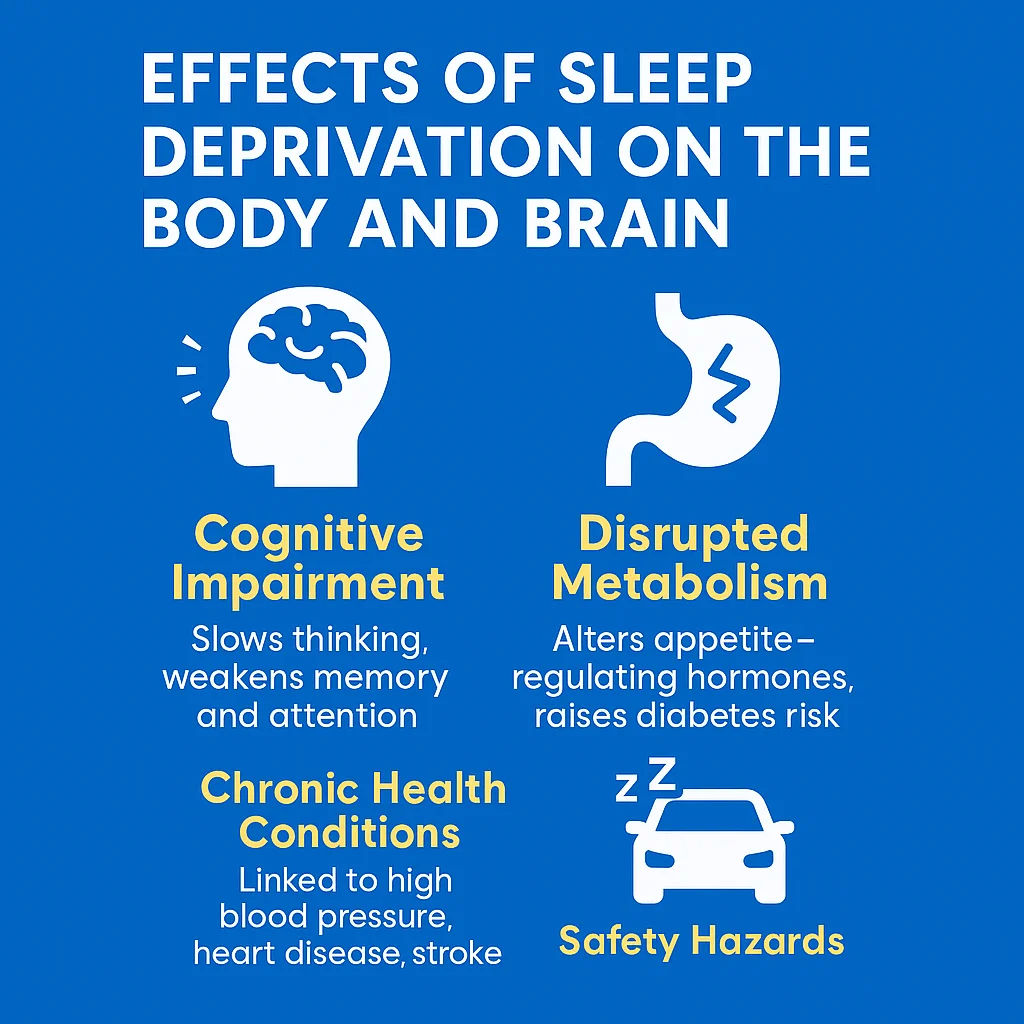
Can chronic lack of sleep lead to hormonal imbalances, reduced cognitive function, and long-term health risks like heart disease and diabetes? Here is why?
Cognitive Impairment:
Sleep can impair core cognitive functions, including attention, memory, learning, and problem-solving. When sleep is deprivation, the brain struggles to consolidate new information and store long-term memories (Cleveland Clinic).
Reaction times are slow, making decision-making less accurate and prone to errors. Research shows that 18-24 hours without sleep can impair cognitive performance to a degree comparable to alcohol intoxication, increasing the risk of accidents and poor mental processing.
Mood and Mental Health:
Sleep and emotional regulation are closely linked. Poor sleep can lead to irritability, heightened stress responses, and reduced ability to cope with challenges. Over time, sleep deprivation increases the risk of mental health conditions like anxiety and depression (Healthline).
People with depression often experience disrupted sleep, creating a vicious cycle. While sleeping medications may offer short-term relief for insomnia, they can disrupt natural sleep architecture and are not a substitute for the brain’s restorative sleep cycles.
Sleep deprivation or consistently poor sleep raises the risk of high blood pressure, short sleep cycles, and even metabolic disorders. Missed sleep leads to daytime sleepiness, reduced activity, and sleep inertia — that groggy feeling after waking. Over one third of American adults report sleep problems such as sleep disorders, sleep disturbances, and sleep difficulties.
Since body positioning affects pressure relief and spinal alignment, choosing the right mattress based on your sleeping style is essential. Explore the ultimate guide to sleep positions and mattress preferences to find the best match for your needs.
Weakened Immune System:
Sleep boosts the immune system by increasing the production of cytokines and infection-fighting cells. Without enough sleep, your body produces fewer protective agents (Cleveland Clinic). People who sleep less than 6 hours a night are likelier to catch colds and experience longer illnesses.
Metabolism:
Sleep regulates hormones that control appetite and blood sugar levels. In a sleep-deprived state, ghrelin levels (which signal hunger) rise and leptin levels (which signal satiety) drop.
This hormonal imbalance leads to overeating and cravings for high-calorie foods. Lower insulin sensitivity increases the risk of type 2 diabetes (Cleveland Clinic).
Chronic Conditions:
Sleep loss is linked to major health conditions like hypertension, heart disease, stroke, and cognitive decline (Healthline). Chronic sleep deprivation increases blood pressure, underscoring the crucial role of sleep in maintaining the cardiovascular and neurological systems.
Studies have shown that sleep regulates inflammation and oxidative stress, two key factors in the development of chronic diseases.
Safety Hazards:
Sleep deprivation significantly increases the risk of accidents. Drowsy driving reduces attention and slows reaction times, similar to alcohol impairment. Microsleeps—brief, involuntary losses of consciousness—can occur suddenly and increase the risk of serious or fatal incidents at work or while driving (Healthline).
- Missing sleep builds up sleep debt, leading to serious health problems.
- Sleep problems may require sleeping pills or professional sleep studies.
- New research links poor sleep hygiene and lack of a bedtime routine to long-term disorders.
- Experts recommend a regular sleep schedule to avoid chronic fatigue and to not always feel tired.
Seeking Professional Help
If sleep difficulties persist despite lifestyle changes, consulting a healthcare provider may be necessary. Sleep medicine, including z-drugs and other medications, should only be considered when recommended by a professional. Addressing underlying sleep disorders can restore sleep quality, reduce higher risk of disease, and help people feel awake and refreshed at the right times.
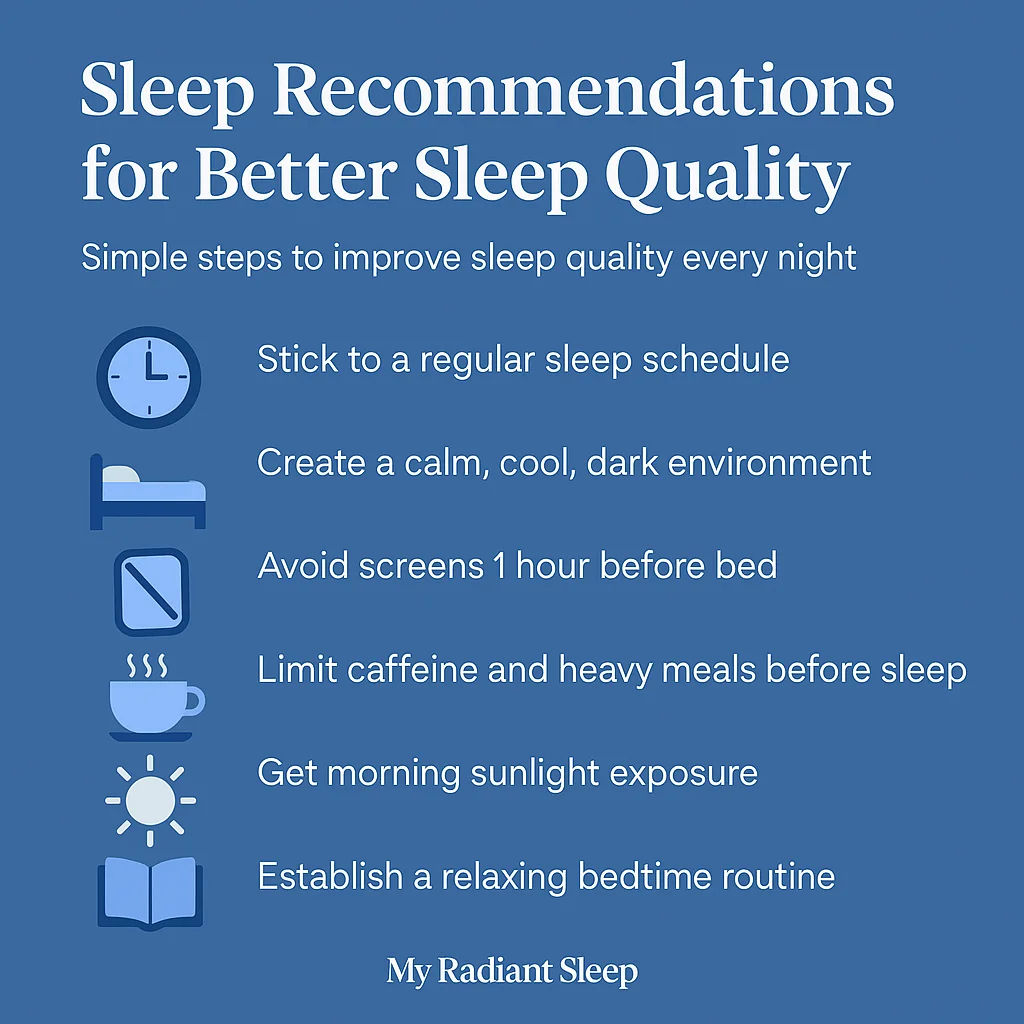
Ongoing Research and New Findings
Recent sleep research continues to uncover its functions. A 2024 study from the NIH Director’s Blog found that neural waves during sleep clear brain waste and prevent neurodegenerative conditions.
Research from Rice University shows that NREM sleep improves cognitive performance by reorganizing neuronal activity for more efficient processing upon waking (ScienceDaily, 2024).
Meanwhile, studies from the Institute of Science and Technology Austria confirm that sleep consolidates memories by reorganizing neural circuits (News-Medical.net, 2025). New research from Washington University in St. Louis (2024) suggests that sleep puts the brain in a state of “criticality” for better decision-making and cognitive flexibility.
Research from UChicago News and others links sleep deprivation to metabolic disorders like diabetes and obesity, emotional regulation, and weakened immune function.
This illustrates the biologically significant importance of sleep for brain and body health.
How Much Sleep Is Enough?
Most people wonder how much sleep they need. Research shows adults require about 7–9 hours of sleep, while infants may need 14 hours within their first 12 months. Older adults may struggle to sleep longer due to shifts in circadian rhythms and sleep patterns, but getting enough sleep remains critical for health status.
Conclusion
Sleep is for healthy brain function, physical recovery, emotional balance, and long-term health.
As science discovers more about sleep, one thing is clear: sleep is good for everything.
A good night’s sleep is essential for overall health; sleep deprivation can be detrimental to one's well-being.
Knowing the biology of sleep helps us understand the role of sleep in cognitive function and physical health.
FAQS
What is the real purpose of sleep?
Sleep enables essential brain maintenance, memory consolidation, and cellular repair throughout the body. It evolved as a survival mechanism that conserves energy, removes metabolic waste from the brain, and restores cognitive function for optimal daytime performance.
How many hours of sleep does the brain need to function properly?
Most adults require 7 to 9 hours of quality sleep each night. The brain needs this time to process information, form memories, and clear toxins. Consistently getting less can impair cognitive function, reaction time, and emotional regulation.
What biological processes happen only during sleep?
During sleep, the brain's glymphatic system activates, flushing out toxic waste proteins. Growth hormone release peaks, facilitating tissue repair and regeneration. Memory consolidation transfers information to long-term storage, while neuronal connections are pruned and strengthened through synaptic homeostasis.
Does the body repair itself while sleeping?
Sleep triggers cellular repair mechanisms throughout the body. Tissues regenerate, muscles recover, protein synthesis increases, and inflammatory responses regulate. The immune system strengthens, hormone production balances, and DNA damage repairs—all crucial maintenance impossible during wakefulness.
How does sleep affect memory and learning?
Sleep transforms short-term memories into long-term memories through a process known as consolidation. It enhances problem-solving abilities and creative connections between concepts. Different sleep stages strengthen different types of memory, with deep sleep supporting factual learning and REM sleep supporting procedural skills.
References
- BBC News. (2015). Why do we sleep? https://www.bbc.com/news/science-environment-32606341
- Cleveland Clinic. (n.d.). Sleep basics. https://my.clevelandclinic.org/health/body/12148-sleep-basics
- Healthline. (n.d.). Why do we sleep? https://www.healthline.com/health/why-do-we-sleep
- Johns Hopkins Medicine. (n.d.). The science of sleep: Understanding what happens when you sleep. https://www.hopkinsmedicine.org/health/wellness-and-prevention/the-science-of-sleep-understanding-what-happens-when-you-sleep
- My Radiant Sleep. (n.d.). Mattress myths and misconceptions debunked! https://www.myradiantsleep.com/mattress-myths-and-misconceptions-debunked
- National Heart, Lung, and Blood Institute. (n.d.). Why is sleep important? https://www.nhlbi.nih.gov/health/sleep/why-sleep-important
- National Institute of Neurological Disorders and Stroke. (n.d.). Brain basics: Understanding sleep. https://www.ninds.nih.gov/health-information/public-education/brain-basics/brain-basics-understanding-sleep
- News-Medical.net. (2025, March 24). New insights into how sleep reorganizes neuronal activity for better memory. https://www.news-medical.net/news/20250324/New-insights-into-how-sleep-reorganizes-neuronal-activity-for-better-memory.aspx
- NIH Director's Blog. (2024, March 14). Study suggests during sleep, neural process helps clear the brain of damaging waste. https://directorsblog.nih.gov/2024/03/14/study-suggests-during-sleep-neural-process-helps-clear-the-brain-of-damaging-waste/
- ScienceDaily. (2024, November 22). New insights into sleep uncover key mechanisms related to cognitive function. https://www.sciencedaily.com/releases/2024/11/241122160750.htm
- UChicago News. (n.d.). How sleep affects human health, explained. https://news.uchicago.edu/explainer/how-sleep-affects-human-health-explained
- Washington University in St. Louis. (2024). Why do we sleep? Researchers propose an answer to this age-old question. https://artsci.wustl.edu/ampersand/why-do-we-sleep-researchers-propose-answer-age-old-question
